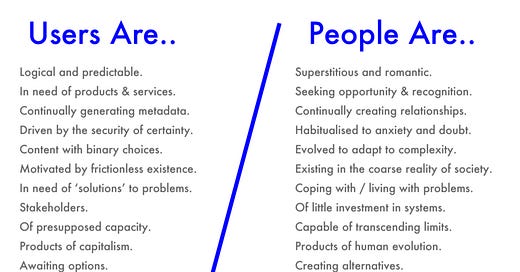Things I'm thinking about
Humans have vibes, computers don't, Pathological impatience, Rick Rubin and Rory Sutherland's four hour conversation
Last week, we sent an email inviting you to become Sublime lifetime believers. Hundreds of you did. To all of our Believers, thank you. 🙏
And if you’re considering becoming a Sublime lifetime believer membership, think of it less as a purchase and more as an investment in a small + mighty team lovingly showing up every day to create a simpler, more intelligent, more communal way to build your second brain.
There are thousands of steps we need to take before we fully realize our vision, but as my friend Anna Gat said: the great thing about achieving small things is that you know the big things are just as achievable, they just take more time.
I hope we can bring a lot of you on this journey with us.
Onto some (other) things I’m thinking about.
Humans have vibes, computers don’t.
It’s common to compare the brain to a computer, but this is a deeply flawed analogy.
This insight was best captured in The Extended Mind – a book that reveals how intelligence exists well beyond our brain. A laptop operates the same whether it is on a desk in an office or on a bench in a park. But human brains are incredibly sensitive to context.
The metaphors we use shape how we view the world. Is the brain like a computer? Maybe, as Gurwinder says, the brain is the opposite: a machine that tries to circumvent thinking. Cognition costs time, and in a society that is information-rich and time-poor, people will use shortcuts to make decisions - feelings, aesthetics, environment, relationships, and yes — vibes.
The feel of things vs the think of things.
My mentor John Borthwick recently turned me to the phrase: “The truth of a thing is the feel of it, not the think of it.”
I’m thinking about how the only way to get better at making things is to make things, and to let the thinking happen inside the work – where you can judge a thing based on how it feels – instead of outside the work.
Can you rationalize why a piece of art moves you? Why you have chemistry with one person over another? Why you like one piece of software more than another that does the same thing? Our decisions are not driven by logic, they are driven by emotion.
Which reminds me of this quote from Danny Meyer’s Setting the Table: Business, like life, is all about how you make people feel. It’s that simple, and it’s that hard.
If you want to go deeper on this, here are some relevant Sublime collections:
Pathological impatience
This Maria Popova quote stopped me in my tracks:
The reason we’re so increasingly intolerant of long articles and why we skim them, why we skip forward even in a short video that reduces a 300-page book into a three-minute animation — is that we’ve been infected with this kind of pathological impatience that makes us want to have the knowledge but not do the work of claiming it.
Pathological impatience. What an accurate way to describe the ails of our time.
Summarize an article in an instant. Automatically respond to all your emails. Get cookies delivered to your doorstep in 10 minutes. Capture the most value with the least work.
Speed and efficiency are the promise of modernity. But speed and efficiency are all destination and no journey. And it is journey that gives life meaning.
How do we reclaim the joy of doing something slow and difficult, the satisfaction of not doing what is easiest? If more effort is wasted doing things that don’t matter (doomscrolling for hours) than is wasted doing things inefficiently (taking time to draft a good email), how do we reorient towards elimination of what’s unnecessary, instead of hyper-optimization of what’s important?
If you want to go deeper on this, here are some relevant Sublime collections:
Plus, some insights and key takeaways from the almost four-hour long Rick Rubin and Rory Sutherland conversation, over on the other side of the paywall.




